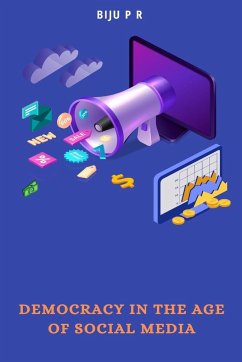Democracy in the Age of Social Media The emergence and widespread use of social media have transformed the landscape of democracy, ushering in new opportunities and challenges for political participation, public discourse, and governance. In the age of social media, individuals have gained unprecedented access to information, platforms for expression, and avenues for engaging in political conversations. However, this digital revolution has also given rise to concerns about disinformation, polarization, and the erosion of democratic values. Social media platforms have become powerful tools for political mobilization and activism. They have facilitated the rapid dissemination of information, enabling citizens to organize and coordinate collective actions more effectively. Hashtags, online petitions, and viral campaigns have amplified the voices of marginalized communities, sparking social and political movements around the world. Social media has empowered citizens, particularly the youth, to engage directly with political processes, express their opinions, and hold their representatives accountable. Moreover, social media has expanded the reach of political discourse, allowing diverse perspectives to be heard. It has democratized the flow of information, enabling individuals to access news and opinions from a wide range of sources. This has the potential to foster an informed citizenry and promote pluralistic debates on critical issues. Social media platforms also provide spaces for marginalized groups to share their experiences, challenge dominant narratives, and demand social justice and equality. However, the rise of social media has also brought about significant challenges to democracy. The spread of disinformation and fake news has become a pervasive problem, undermining the credibility of traditional media sources and eroding trust in democratic institutions. The viral nature of false information can shape public opinion, influence election outcomes, and deepen societal divisions. The algorithms and echo chambers created by social media platforms have the potential to reinforce existing biases, creating filter bubbles and further polarizing public discourse. Privacy concerns and the manipulation of social media platforms for political purposes have also raised alarms. Data breaches and the exploitation of personal information for targeted messaging and micro-targeting have fueled debates about the integrity of democratic processes. The power wielded by social media giants to control the flow of information and shape public narratives has sparked discussions about the need for regulation and transparency. To ensure the positive impact of social media on democracy, various stakeholders must address these challenges. Governments, social media platforms, civil society organizations, and individuals all play crucial roles. Strengthening media literacy and critical thinking skills among citizens can empower them to discern reliable information from misinformation. Promoting transparency and accountability in algorithmic processes can mitigate the risks of polarization and filter bubbles. Policymakers can work toward creating regulations that balance freedom of expression with responsible content moderation and data protection. In conclusion, social media has become a powerful force in shaping contemporary democracy. It has opened up avenues for political participation, expanded access to information, and fostered public discourse. However, challenges such as disinformation, polarization, and privacy concerns must be addressed to ensure that social media remains a positive force for democratic engagement. By promoting transparency, media literacy, and responsible governance of these platforms, societies can harness the potential of social media to strengthen democratic values, participation, and inclusivity.








